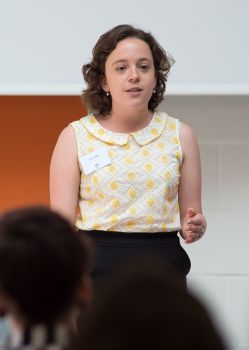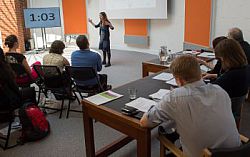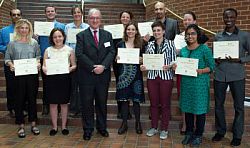Quantum physicist wins three-minute PhD contest
A student working in the baffling field of quantum computing has won a University-wide competition for explaining her PhD in just three minutes.
 First prize of a £1,000 cheque was awarded to Anna Webb for her presentation on ‘Quantum Computing with Single Atoms’
First prize of a £1,000 cheque was awarded to Anna Webb for her presentation on ‘Quantum Computing with Single Atoms’
 Olaya Moldes took up the challenge to communicate her doctoral research to a non-specialist audience with the aid of just one slide
Olaya Moldes took up the challenge to communicate her doctoral research to a non-specialist audience with the aid of just one slide
 Professor Michael Davies, Pro-Vice-Chancellor (Research), praised the knowledge and enthusiasm demonstrated by all 12 Three Minute Thesis speakers
Professor Michael Davies, Pro-Vice-Chancellor (Research), praised the knowledge and enthusiasm demonstrated by all 12 Three Minute Thesis speakers
Anna Webb, a doctoral researcher in the School of Mathematical and Physical Sciences, beat off stiff competition from 11 of her peers to triumph in Sussex’s first-ever Three Minute Thesis contest on Wednesday (8 June).
Anna impressed the judges with her fascinating research on how microwaves could hold the key to building the world’s first large-scale quantum computer – an invention that would revolutionise computing.
But before doing this she had to first explain the foundations of quantum mechanics - a notoriously tough task. Indeed, as Anna recalled, even the Nobel Prize-winning physicist Richard Feynman once said that “nobody understands quantum mechanics”.
“Anyone who can explain quantum computing to me in just three minutes deserves to win this prize,” said Professor Michael Davies, who chaired the contest in his role as Pro-Vice-Chancellor for Research. He added: “Anna was superb.”
Emma Scanlan in the School of English took second prize with a passionate presentation of her PhD thesis on poetry and politics in Hawaii. The audience of staff and students heard how a language rich with metaphor and dual meaning has enabled a radical Hawaiian nationalist movement to thrive and survive.
The ‘People’s Choice’ prize – chosen by audience members – went to Mahmoud Bukar Maina for his poignant, yet uplifting, talk on his part in the search for a cure for Alzheimer’s disease.
Anna won £1,000 to attend an international conference; Emma’s prize was an iPad Air tablet, and Mahmoud won an iPad Mini.
The other nine contestants covered topics across the arts, sciences and social science, including: how we can use lasers to eliminate space debris; re-imagining our living arrangements in old age; and what poetry written from a jail cell in the 1970s can tell us about radicalisation in the UK today.
Professor Davies added: “An 80,000-word thesis would take nine hours to present; our researchers had just three minutes. All 12 presentations were absolutely fantastic – I really learnt a lot.”
Founded by the University of Queensland, Three Minute Thesis is an international competition that challenges participants to communicate their doctoral research to a non-specialist audience with the aid of just one slide.
Wednesday’s event, in the Attenborough Centre for the Creative Arts, was the first to be held at Sussex.
The judging panel considered the speakers on criteria such as clarity, enthusiasm, and performance.
Anna now goes forward to the UK semi-final in July, and will compete against doctoral researchers from other participating universities.
The final takes place at the Vitae conference in September, where the winner last year was awarded £3,000 to spend on public engagement.
